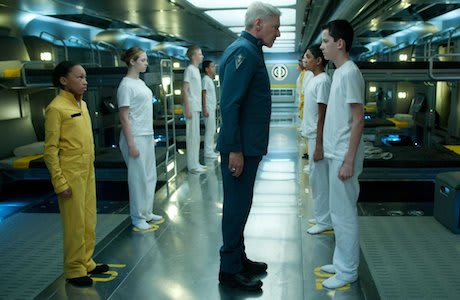Successfully adapting a famous and widely beloved young adult science fiction novel written by an outspoken bigot is no easy task. Thankfully, Gavin Hood proves far more capable of conquering this particular challenge than he did at wrestling with Fox over X-Men Origins: Wolverine.
To make the narrow introspection of this compelling revenge fantasy work as the big budget event film it needed to be, the Tsotsi director sensibly streamlines the wider political aspirations of Orson Scott Card's novel, wisely scouring the text clean of its overt, omnipresent homophobia, omitting the deep undercurrents of homoeroticism in the processes. Seriously, in popular literature only Naked Lunch exceeds Ender's Game in frequent, intimate descriptions of naked boys.
For those unfamiliar with the basic plot of this military industrial complex comfort blanket, Ender's Game follows the harsh and manipulative tutelage of gifted children in the art of war. Ender Wiggins (excellently realized by Hugo's Asa Butterfield) is mankind's next great hope in a galactic conflict against an alien race (referred to by their species name in the movie instead of as "the buggers" — yes they're an insectoid species but the hate-speak connotations are obvious). Selected for his aptitude for strategic thinking and willingness to go to extreme lengths to prevent future threats (as demonstrated by the slender outsider's response to being bullied), Ender is plucked from his family on Earth and taken to an international military space station for training.
There, Ender's struggles to stand up to bullying without going overboard continue in increasingly extreme forms. From his insecure peers to his platoon commanders to the Big Kahuna, Colonel Graff (a perfectly cast Harrison Ford), every person in a position of power is threatened by the brilliant young boy's exceptional empathy and confidence, even while using him for their own ends. Most of the interpersonal dynamics are expressed via Ender's interactions in what's basically space boot camp, but for any viewers uncertain of exactly what's going on, frequent conversations between Graff and Major Anderson (made a woman in one of this version's welcome estrogen injections) bluntly spell it out.
Much of the training is conducted in an anti-gravity obstacle chamber called the "Battle Room." These scenes are well realized but somewhat skimmed over in favour of the additional time afforded to the final act and the expository ramblings of the film's one marquee name. Omitting the subplot regarding the political activities of Ender's siblings on Earth makes perfect sense, but rushing past these key development points in Ender's trajectory towards unquestioned leadership doesn't convincingly develop a distinct sense of his prodigiousness in combat.
Even with all the cuts and a nearly two-hour runtime, there's still much plot to burn through and Hood is judicious about balancing his responsibilities as a commercial filmmaker with being a storyteller. Fear not, faithful fans of the book: the ending retains its impact and the rendering of Ender's excursions in a psychologically adaptive videogame is attractive and quite satisfying.
Like Zack Synder's take on The Watchmen, Gavin Hood's Ender's Game is a very well made, literal surface translation of the source material. Unlike Alan Moore's masterful satire, however, drastically tapering the subtext is beneficial to this story. In fact, it'd have been wildly irresponsible not to, though one can't help but wonder what a gutsy subversive director like Paul Verhoeven might have found to say about Card's self-hating predilections.
Social politics aside, this iteration of Ender's Game is the kind of thoughtful yet easily digestible character-driven sci-fi cinema it'd be nice to see more of on the big screen.
(eOne)To make the narrow introspection of this compelling revenge fantasy work as the big budget event film it needed to be, the Tsotsi director sensibly streamlines the wider political aspirations of Orson Scott Card's novel, wisely scouring the text clean of its overt, omnipresent homophobia, omitting the deep undercurrents of homoeroticism in the processes. Seriously, in popular literature only Naked Lunch exceeds Ender's Game in frequent, intimate descriptions of naked boys.
For those unfamiliar with the basic plot of this military industrial complex comfort blanket, Ender's Game follows the harsh and manipulative tutelage of gifted children in the art of war. Ender Wiggins (excellently realized by Hugo's Asa Butterfield) is mankind's next great hope in a galactic conflict against an alien race (referred to by their species name in the movie instead of as "the buggers" — yes they're an insectoid species but the hate-speak connotations are obvious). Selected for his aptitude for strategic thinking and willingness to go to extreme lengths to prevent future threats (as demonstrated by the slender outsider's response to being bullied), Ender is plucked from his family on Earth and taken to an international military space station for training.
There, Ender's struggles to stand up to bullying without going overboard continue in increasingly extreme forms. From his insecure peers to his platoon commanders to the Big Kahuna, Colonel Graff (a perfectly cast Harrison Ford), every person in a position of power is threatened by the brilliant young boy's exceptional empathy and confidence, even while using him for their own ends. Most of the interpersonal dynamics are expressed via Ender's interactions in what's basically space boot camp, but for any viewers uncertain of exactly what's going on, frequent conversations between Graff and Major Anderson (made a woman in one of this version's welcome estrogen injections) bluntly spell it out.
Much of the training is conducted in an anti-gravity obstacle chamber called the "Battle Room." These scenes are well realized but somewhat skimmed over in favour of the additional time afforded to the final act and the expository ramblings of the film's one marquee name. Omitting the subplot regarding the political activities of Ender's siblings on Earth makes perfect sense, but rushing past these key development points in Ender's trajectory towards unquestioned leadership doesn't convincingly develop a distinct sense of his prodigiousness in combat.
Even with all the cuts and a nearly two-hour runtime, there's still much plot to burn through and Hood is judicious about balancing his responsibilities as a commercial filmmaker with being a storyteller. Fear not, faithful fans of the book: the ending retains its impact and the rendering of Ender's excursions in a psychologically adaptive videogame is attractive and quite satisfying.
Like Zack Synder's take on The Watchmen, Gavin Hood's Ender's Game is a very well made, literal surface translation of the source material. Unlike Alan Moore's masterful satire, however, drastically tapering the subtext is beneficial to this story. In fact, it'd have been wildly irresponsible not to, though one can't help but wonder what a gutsy subversive director like Paul Verhoeven might have found to say about Card's self-hating predilections.
Social politics aside, this iteration of Ender's Game is the kind of thoughtful yet easily digestible character-driven sci-fi cinema it'd be nice to see more of on the big screen.




